全新版大学英语综合教程3 课文翻译unit 1 Mr. Doherty Builds His Dream Life
全新版大学英语综合教程3各单元summary课本原文及翻译
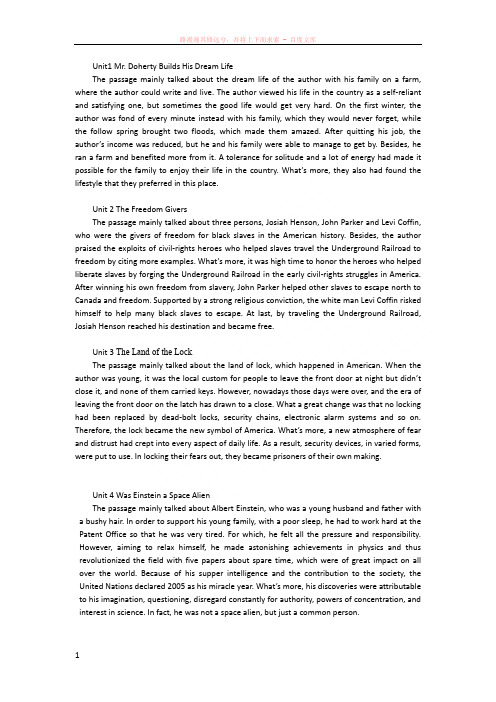
Unit1 Mr. Doherty Builds His Dream LifeThe passage mainly talked about the dream life of the author with his family on a farm, where the author could write and live. The author viewed his life in the country as a self-reliant and satisfying one, but sometimes the good life would get very hard. On the first winter, the author was fond of every minute instead with his family, which they would never forget, while the follow spring brought two floods, which made them amazed. After quitting his job, the author’s income was reduced, but he and his family were able to manage to get by. Besides, he ran a farm and benefited more from it. A tolerance for solitude and a lot of energy had made it possible for the family to enjoy their life in the country. What’s more, they also had found the lifestyle that they preferred in this place.Unit 2 The Freedom GiversThe passage mainly talked about three persons, Josiah Henson, John Parker and Levi Coffin, who were the givers of freedom for black slaves in the American history. Besides, the author praised the exploits of civil-rights heroes who helped slaves travel the Underground Railroad to freedom by citing more examples. What’s more, it was high time to honor the heroes who helped liberate slaves by forging the Underground Railroad in the early civil-rights struggles in America. After winning his own freedom from slavery, John Parker helped other slaves to escape north to Canada and freedom. Supported by a strong religious conviction, the white man Levi Coffin risked himself to help many black slaves to escape. At last, by traveling the Underground Railroad, Josiah Henson reached his destination and became free.Unit 3 The Land of the LockThe passage mainly talked about the land of lock, which happened in American. When the author was young, it was the local custom for people to leave the front door at night but didn’t close it, and none of them carried keys. However, nowadays those days were over, and the era of leaving the front door on the latch has drawn to a close. What a great change was that no locking had been replaced by dead-bolt locks, security chains, electronic alarm systems and so on. Therefore, the lock became the new symbol of America. What’s more, a new atmosphere of fear and distrust had crept into every aspect of daily life. As a result, security devices, in varied forms, were put to use. In locking their fears out, they became prisoners of their own making.Unit 4 Was Einstein a Space AlienThe passage mainly talked about Albert Einstein, who was a young husband and father with a bushy hair. In order to support his young family, with a poor sleep, he had to work hard at the Patent Office so that he was very tired. For which, he felt all the pressure and responsibility. However, aiming to relax himself, he made astonishing achievements in physics and thus revolutionized the field with five papers about spare time, which were of great impact on all over the world. Because of his supper intelligence and the contribution to the society, the United Nations declared 2005 as his miracle year. What’s more, his discoveries were attributable to his imagination, questioning, disregard constantly for authority, powers of concentration, and interest in science. In fact, he was not a space alien, but just a common person.Unit 5 Three Thank-You LettersThe passage mainly talked about the author’s three special letters, by which he wanted to celebrate the true meaning of Thanksgiving. On Thanksgiving Day 1943, as a young coastguardsman at sea, he worked as a cook. While he was going to think about Thanksgiving, he came up with the idea of expressing his gratitude to people who had helped him before. Therefore, he wrote three thank-you letters to three persons, his father, the Rev. Nelson and his grandmother. At a mail call, he got three letters in reply, which drove him to think deeply. After he retired from the Coast Guard, he still never forgot these letters which gave him an insight into expressing appreciation for one’s efforts. Furthermore, he wished everyone to find the good and then praise it.Unit 6 The Last LeafThe passage mainly talked about the last leaf, which Johnsy gave a sight to after she got the pneumonia and lived in the hospital. She looked out the window and counted the leaves on an old ivy vine. Furthermore, she made up her mind to end her life when the last leaf fell. When she saw the last leaf still cling to the vine after two nights’ rain and wind, she decided not to give up her life. In fact, the last leaf, called a masterpiece by Behrman who risked his life painting it there the night that the last leaf fell, was actually painted onto the wall. However, because it looked so real that she could have never imagined that it was faked. In a deeper sense, it saved her life.unit 1 Mr. Doherty Builds His Dream LifeIn America many people have a romantic idea of life in the countryside. Many living in towns dream of starting up their own farm, of living off the land. Few get round to putting their dreams into practice. This is perhaps just as well, as the life of a farmer is far from easy, as Jim Doherty discovered when he set out to combine being a writer with running a farm. Nevertheless, as he explains, he has no regrets and remains enthusiastic about his decision to change his way of life.在美国,不少人对乡村生活怀有浪漫的情感。
全新版大学英语综合教程3 课文翻译unit 1 Mr. Doherty Builds His Dream Life.pptx

学海无涯
unit 1 Mr. Doherty Builds His Dream Life In America many people have a romantic idea of life in the countryside. Many living in towns dream of starting up their own farm, of living off the land. Few get round to putting their dreams into practice. This is perhaps just as well, as the life of a farmer is far from easy, as Jim Doherty discovered when he set out to combine being a writer with running a farm. Nevertheless, as he explains, he has no regrets and remains enthusiastic about his decision to change his way of life. 在美国, 不少人对乡村生活怀有浪漫的情感。 许多居住在城镇的人梦想着自己办个农 场,梦想着靠土地为生。很少有人真去把梦想变为现实。或许这也没有什么不好,因为,正 如 吉姆· 多尔蒂当初开始其写作和农场经营双重生涯时所体验到的那样, 农耕生活远非轻松 自 在。但他写道,自己并不后悔,对自己作出的改变生活方式的决定仍热情不减。
全新版大学英语综合教程3课文原文与翻译完整版
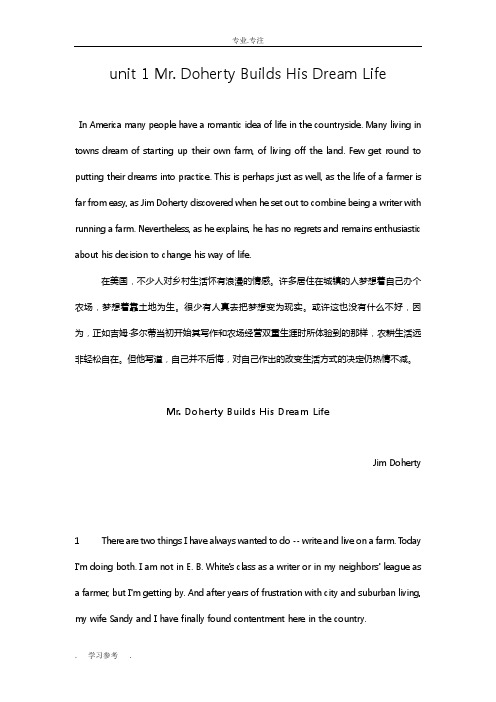
unit 1 Mr. Doherty Builds His Dream LifeIn America many people have a romantic idea of life in the countryside. Many living in towns dream of starting up their own farm, of living off the land. Few get round to putting their dreams into practice. This is perhaps just as well, as the life of a farmer is far from easy, as Jim Doherty discovered when he set out to combine being a writer with running a farm. Nevertheless, as he explains, he has no regrets and remains enthusiastic about his decision to change his way of life.在美国,不少人对乡村生活怀有浪漫的情感。
许多居住在城镇的人梦想着自己办个农场,梦想着靠土地为生。
很少有人真去把梦想变为现实。
或许这也没有什么不好,因为,正如吉姆·多尔蒂当初开始其写作和农场经营双重生涯时所体验到的那样,农耕生活远非轻松自在。
但他写道,自己并不后悔,对自己作出的改变生活方式的决定仍热情不减。
Mr. Doherty Builds His Dream LifeJim Doherty1 There are two things I have always wanted to do -- write and live on a farm. Today I'm doing both. I am not in E. B. White's class as a writer or in my neighbors' league as a farmer, but I'm getting by. And after years of frustration with city and suburban living, my wife Sandy and I have finally found contentment here in the country.有两件事是我一直想做的――写作与务农。
(完整word版)全新版大学英语综合教程3课文原文及翻译完整版

unit 1 Mr. Doherty Builds His Dream LifeIn America many people have a romantic idea of life in the countryside. Many living in towns dream of starting up their own farm, of living off the land. Few get round to putting their dreams into practice. This is perhaps just as well, as the life of a farmer is far from easy, as Jim Doherty discovered when he set out to combine being a writer with running a farm. Nevertheless, as he explains, he has no regrets and remains enthusiastic about his decision to change his way of life.在美国,不少人对乡村生活怀有浪漫的情感。
许多居住在城镇的人梦想着自己办个农场,梦想着靠土地为生。
很少有人真去把梦想变为现实。
或许这也没有什么不好,因为,正如吉姆·多尔蒂当初开始其写作和农场经营双重生涯时所体验到的那样,农耕生活远非轻松自在。
但他写道,自己并不后悔,对自己作出的改变生活方式的决定仍热情不减。
Mr. Doherty Builds His Dream LifeJim Doherty1 There are two things I have always wanted to do -- write and live on a farm. Today I'm doing both. I am not in E. B. White's class as a writer or in my neighbors' league as a farmer, but I'm getting by. And after years of frustration with city and suburban living, my wife Sandy and I have finally found contentment here in the country.有两件事是我一直想做的――写作与务农。
全新版大学英语综合教程3课文原文及翻译完整版.doc
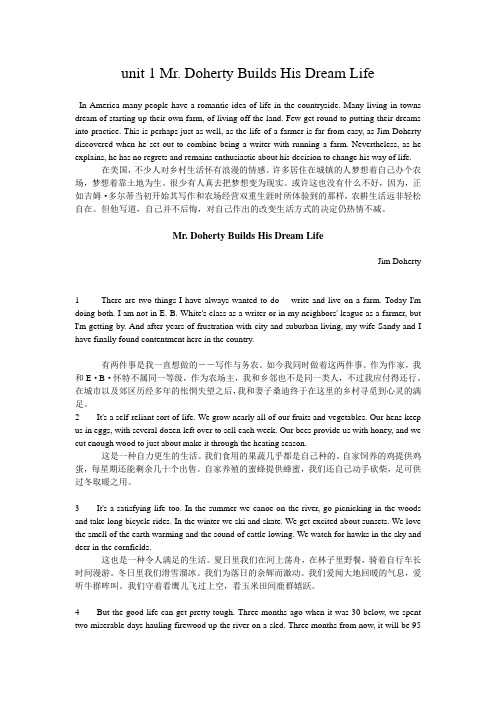
unit 1 Mr. Doherty Builds His Dream LifeIn America many people have a romantic idea of life in the countryside. Many living in towns dream of starting up their own farm, of living off the land. Few get round to putting their dreams into practice. This is perhaps just as well, as the life of a farmer is far from easy, as Jim Doherty discovered when he set out to combine being a writer with running a farm. Nevertheless, as he explains, he has no regrets and remains enthusiastic about his decision to change his way of life.在美国,不少人对乡村生活怀有浪漫的情感。
许多居住在城镇的人梦想着自己办个农场,梦想着靠土地为生。
很少有人真去把梦想变为现实。
或许这也没有什么不好,因为,正如吉姆·多尔蒂当初开始其写作和农场经营双重生涯时所体验到的那样,农耕生活远非轻松自在。
但他写道,自己并不后悔,对自己作出的改变生活方式的决定仍热情不减。
Mr. Doherty Builds His Dream LifeJim Doherty1 There are two things I have always wanted to do -- write and live on a farm. Today I'm doing both. I am not in E. B. White's class as a writer or in my neighbors' league as a farmer, but I'm getting by. And after years of frustration with city and suburban living, my wife Sandy and I have finally found contentment here in the country.有两件事是我一直想做的――写作与务农。
全新版大学英语综合教程3课文原文及翻译完整版
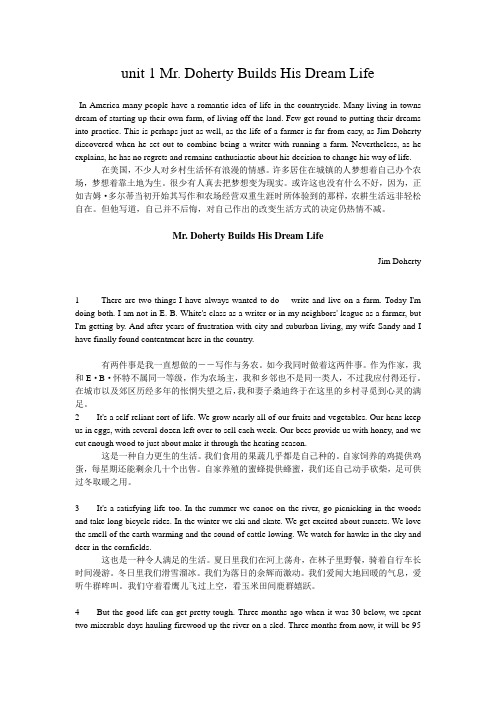
unit 1 Mr. Doherty Builds His Dream LifeIn America many people have a romantic idea of life in the countryside. Many living in towns dream of starting up their own farm, of living off the land. Few get round to putting their dreams into practice. This is perhaps just as well, as the life of a farmer is far from easy, as Jim Doherty discovered when he set out to combine being a writer with running a farm. Nevertheless, as he explains, he has no regrets and remains enthusiastic about his decision to change his way of life.在美国,不少人对乡村生活怀有浪漫的情感。
许多居住在城镇的人梦想着自己办个农场,梦想着靠土地为生。
很少有人真去把梦想变为现实。
或许这也没有什么不好,因为,正如吉姆·多尔蒂当初开始其写作和农场经营双重生涯时所体验到的那样,农耕生活远非轻松自在。
但他写道,自己并不后悔,对自己作出的改变生活方式的决定仍热情不减。
Mr. Doherty Builds His Dream LifeJim Doherty1 There are two things I have always wanted to do -- write and live on a farm. Today I'm doing both. I am not in E. B. White's class as a writer or in my neighbors' league as a farmer, but I'm getting by. And after years of frustration with city and suburban living, my wife Sandy and I have finally found contentment here in the country.有两件事是我一直想做的――写作与务农。
全新版大学英语综合教程3各单元summary-课本原文及翻译汇编

Unit1 Mr. Doherty Builds His Dream LifeThe passage mainly talked about the dream life of the author with his family on a farm, where the author could write and live. The author viewed his life in the country as a self-reliant and satisfying one, but sometimes the good life would get very hard. On the first winter, the author was fond of every minute instead with his family, which they would never forget, while the follow spring brought two floods, which made them amazed. After quitting his job, the author’s income was reduced, but he and his family were able to manage to get by. Besides, he ran a farm and benefited more from it. A tolerance for solitude and a lot of energy had made it possible for the family to enjoy their life in the country. What’s more, they also had found the lifestyle that they preferred in this place.Unit 2 The Freedom GiversThe passage mainly talked about three persons, Josiah Henson, John Parker and Levi Coffin, who were the givers of freedom for black slaves in the American history. Besides, the author praised the exploits of civil-rights heroes who helped slaves travel the Underground Railroad to freedom by citing more examples. What’s more, it was high time to honor the heroes who helped liberate slaves by forging the Underground Railroad in the early civil-rights struggles in America. After winning his own freedom from slavery, John Parker helped other slaves to escape north to Canada and freedom. Supported by a strong religious conviction, the white man Levi Coffin risked himself to help many black slaves to escape. At last, by traveling the Underground Railroad, Josiah Henson reached his destination and became free.Unit 3 The Land of the LockThe passage mainly talked about the land of lock, which happened in American. When the author was young, it was the local custom for people to leave the front door at night but didn’t close it, and none of them carried keys. However, nowadays those days were over, and the era of leaving the front door on the latch has drawn to a close. What a great change was that no locking had been replaced by dead-bolt locks, security chains, electronic alarm systems and so on. Therefore, the lock became the new symbol of America. What’s more, a new atmosphere of fear and distrust had crept into every aspect of daily life. As a result, security devices, in varied forms, were put to use. In locking their fears out, they became prisoners of their own making.Unit 4 Was Einstein a Space AlienThe passage mainly talked about Albert Einstein, who was a young husband and father with a bushy hair. In order to support his young family, with a poor sleep, he had to work hard at the Patent Office so that he was very tired. For which, he felt all the pressure and responsibility. However, aiming to relax himself, he made astonishing achievements in physics and thus revolutionized the field with five papers about spare time, which were of great impact on all over the world. Because of his supper intelligence and the contribution to the society, the United Nations declared 2005 as his miracle year. What’s more, his discoveries were attributable to his imagination, questioning, disregard constantly for authority, powers of concentration, and interest in science. In fact, he was not a space alien, but just a common person.Unit 5 Three Thank-You LettersThe passage mainly talked about the author’s three special letters, by which he wanted to celebrate the true meaning of Thanksgiving. On Thanksgiving Day 1943, as a young coastguardsman at sea, he worked as a cook. While he was going to think about Thanksgiving, he came up with the idea of expressing his gratitude to people who had helped him before. Therefore, he wrote three thank-you letters to three persons, his father, the Rev. Nelson and his grandmother. At a mail call, he got three letters in reply, which drove him to think deeply. After he retired from the Coast Guard, he still never forgot these letters which gave him an insight into expressing appreciation for one’s efforts. Furthermore, he wished everyone to find the good and then praise it.Unit 6 The Last LeafThe passage mainly talked about the last leaf, which Johnsy gave a sight to after she got the pneumonia and lived in the hospital. She looked out the window and counted the leaves on an old ivy vine. Furthermore, she made up her mind to end her life when the last leaf fell. When she saw the last leaf still cling to the vine after two nights’ rain and wind, she decided not to give up her life. In fact, the last leaf, called a masterpiece by Behrman who risked his life painting it there the night that the last leaf fell, was actually painted onto the wall. However, because it looked so real that she could have never imagined that it was faked. In a deeper sense, it saved her life.unit 1 Mr. Doherty Builds His Dream LifeIn America many people have a romantic idea of life in the countryside. Many living in towns dream of starting up their own farm, of living off the land. Few get round to putting their dreams into practice. This is perhaps just as well, as the life of a farmer is far from easy, as Jim Doherty discovered when he set out to combine being a writer with running a farm. Nevertheless, as he explains, he has no regrets and remains enthusiastic about his decision to change his way of life.在美国,不少人对乡村生活怀有浪漫的情感。
全新版大学英语(第二版)综合教程3课文原文及翻译Until1-8较完整版

2 It's a self-reliant sort of life. We grow nearly all of our fruits and vegetables. Our hens keep us in eggs, with several dozen left over to sell each week. Our bees provide us with honey, and we cut enough wood to just about make it through the heating season.
5 Inbetween such chores, I manage to spend 50 to 60 hours a week at the typewriter or doing reporting for the freelance articles I sell to magazines and newspapers. Sandy, meanwhile, pursues her own demanding schedule. Besides the usual household routine, she oversees the garden and beehives, bakes bread, cans and freezes, drives the kids to their music lessons, practices with them, takes organ lessons on her own, does research and typing for me, writes an article herself now and then, tends the flowerbeds, stacks a little wood and delivers the eggs. There is, as the old saying goes, no rest for the wicked on a place like this -- and not much for the virtuous either.在这些活计之间,我每周要抽空花五、六十个小时,不是打字撰文,就是为作为自由撰稿人投给报刊的文章进行采访。桑迪则有她自己繁忙的工作日程。除了日常的家务,她还照管菜园和蜂房,烘烤面包,将食品装罐、冷藏,开车送孩子学音乐,和他们一起练习,自己还要上风琴课,为我做些研究工作并打字,自己有时也写写文章,还要侍弄花圃,堆摞木柴、运送鸡蛋。正如老话说的那样,在这种情形之下,坏人不得闲――贤德之人也歇不了。
全新版大学英语综合教程3课文原文和翻译
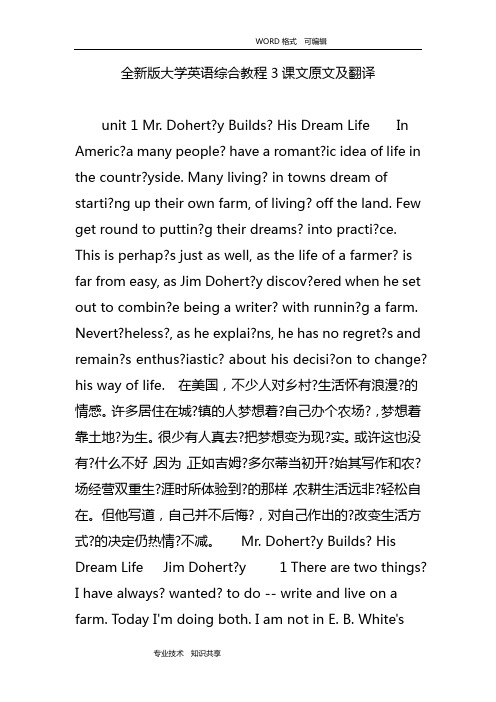
全新版大学英语综合教程3课文原文及翻译unit 1 Mr. Dohert?y Builds? His Dream Life In Americ?a many people? have a romant?ic idea of life in the countr?yside. Many living? in towns dream of starti?ng up their own farm, of living? off the land. Few get round to puttin?g their dreams? into practi?ce. This is perhap?s just as well, as the life of a farmer? is far from easy, as Jim Dohert?y discov?ered when he set out to combin?e being a writer? with runnin?g a farm. Nevert?heless?, as he explai?ns, he has no regret?s and remain?s enthus?iastic? about his decisi?on to change? his way of life. 在美国,不少人对乡村?生活怀有浪漫?的情感。
许多居住在城?镇的人梦想着?自己办个农场?,梦想着靠土地?为生。
很少有人真去?把梦想变为现?实。
或许这也没有?什么不好,因为,正如吉姆?多尔蒂当初开?始其写作和农?场经营双重生?涯时所体验到?的那样,农耕生活远非?轻松自在。
但他写道,自己并不后悔?,对自己作出的?改变生活方式?的决定仍热情?不减。
Mr. Dohert?y Builds? His Dream Life Jim Dohert?y 1 There are two things?I have always? wanted? to do -- write and live on a farm. Today I'm doing both. I am not in E. B. White'sclass as a writer? or in my neighb?ors' league? as a farmer?, but I'm by. And after years of frustr?ation with city and suburb?an living?, my wife Sandy and I have gettin?gfinall?y found conten?tment here in the countr?y. 多尔蒂先生创?建自己的理想?生活吉姆?多尔蒂有两件事是我?一直想做的――写作与务农。
全新版大学英语综合教程3课文翻译unit 1
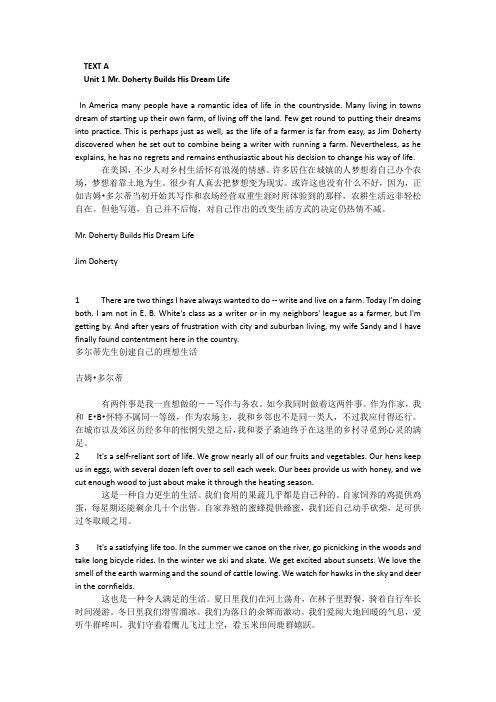
TEXT AUnit 1 Mr. Doherty Builds His Dream LifeIn America many people have a romantic idea of life in the countryside. Many living in towns dream of starting up their own farm, of living off the land. Few get round to putting their dreams into practice. This is perhaps just as well, as the life of a farmer is far from easy, as Jim Doherty discovered when he set out to combine being a writer with running a farm. Nevertheless, as he explains, he has no regrets and remains enthusiastic about his decision to change his way of life.在美国,不少人对乡村生活怀有浪漫的情感。
许多居住在城镇的人梦想着自己办个农场,梦想着靠土地为生。
很少有人真去把梦想变为现实。
或许这也没有什么不好,因为,正如吉姆•多尔蒂当初开始其写作和农场经营双重生涯时所体验到的那样,农耕生活远非轻松自在。
但他写道,自己并不后悔,对自己作出的改变生活方式的决定仍热情不减。
Mr. Doherty Builds His Dream LifeJim Doherty1 There are two things I have always wanted to do -- write and live on a farm. Today I'm doing both. I am not in E. B. White's class as a writer or in my neighbors' league as a farmer, but I'm getting by. And after years of frustration with city and suburban living, my wife Sandy and I have finally found contentment here in the country.多尔蒂先生创建自己的理想生活吉姆•多尔蒂有两件事是我一直想做的――写作与务农。
全新版大学英语综合教程3课文原文及翻译

u nit 1 Mr.Doherty Bu ilds His D ream LifeIn Ameri ca many pe ople havea romantic idea of l ife in the countrysi de. Many l iving in t owns dream of starti ng up thei r own farm, of livin g off theland. Fewget roundto putting their dre ams into p ractice. T his is per haps justas well, a s the life of a farm er is farfrom easy,as Jim Do herty disc overed whe n he set o ut to comb ine beinga writer w ith runnin g a farm.Neverthele ss, as heexplains,he has noregrets an d remainsenthusiast ic about h is decisio n to chang e his wayof life. 在美国,不少人对乡村生活怀有浪漫的情感。
许多居住在城镇的人梦想着自己办个农场,梦想着靠土地为生。
很少有人真去把梦想变为现实。
或许这也没有什么不好,因为,正如吉姆·多尔蒂当初开始其写作和农场经营双重生涯时所体验到的那样,农耕生活远非轻松自在。
但他写道,自己并不后悔,对自己作出的改变生活方式的决定仍热情不减。
Mr. Dohe rty Builds His Dream LifeJim Doherty 1 Th ere are tw o things I have alwa ys wantedto do -- w rite and l iveon a f arm. Today I'm doing both. I a m not in E. B. White's class a s a writer or in myneighbors'league as a farmer, but I'm g etting by.And after years offrustratio n with cit y and subu rban livin g, my wife Sandy and I have fi nally foun d contentm ent here i n the coun try.多尔蒂先生创建自己的理想生活吉姆·多尔蒂有两件事是我一直想做的――写作与务农。
全新版大学英语(第二版)综合教程3课文原文及翻译Until1-6

unit 1 Mr. Doherty Builds His Dream LifeMr. Doherty Builds His Dream LifeJim Doherty1 There are two things I have always wanted to do -- write and live on a farm. Today I'm doing both. I am not in E. B. White's class as a writer or in my neighbors' league as a farmer, but I'm getting by. And after years of frustration with city and suburban living, my wife Sandy and I have finally found contentment here in the country.多尔蒂先生创建自己的理想生活吉姆·多尔蒂有两件事是我一直想做的――写作与务农。
如今我同时做着这两件事。
作为作家,我和E·B·怀特不属同一等级,作为农场主,我和乡邻也不是同一类人,不过我应付得还行。
在城市以及郊区历经多年的怅惘失望之后,我和妻子桑迪终于在这里的乡村寻觅到心灵的满足。
2 It's a self-reliant sort of life. We grow nearly all of our fruits and vegetables. Our hens keep us in eggs, with several dozen left over to sell each week. Our bees provide us with honey, and we cut enough wood to just about make it through the heating season.这是一种自力更生的生活。
全新版大学英语(第二版)综合教程3课文原文及翻译Until1-8较完

全新版大学英语(第二版)综合教程3课文原文及翻译Until1-8较完1 / 55目录Unit1 Text A Mr. Doherty Builds His Dream Life 1Unit1 Text B American Family Life: The Changing Picture Unit2 Text A The Freedom Givers 10 Unit3 Text A The Land of the Lock 14 Unit3 Text B Why I Bought A Gun16 Unit4 Text A Was Einstein a Space Alien? 21 Unit5 Text A Writing Three Thank-You Letters 25 Unit6 Text A The Last Leaf2833 41474Unit7 Text A Life of a Salesman Unit7 Text B Bricklayer's BoyUnit8 Text A Human Cloning: A Scientist’s Story Unit8 Text B Second Thoughts on Cloning50Unit1 Text A Mr. Doherty Builds His Dream Life多尔蒂先生创建自己的理想生活吉姆・多尔蒂Jim Doherty1 There are two things I have always wanted to do -- write and live ona farm. Today I'm doing both. I am not in E. B. White's class as a writer orin my neighbors' league as a farmer, but I'm getting by. And after years of frustration with city and suburban living, my wife Sandy and I have finally found contentment here in the country.有两件事是我一直想做的�D�D写作与务农。
全新版大学英语综合教程3背诵段落及课后翻译
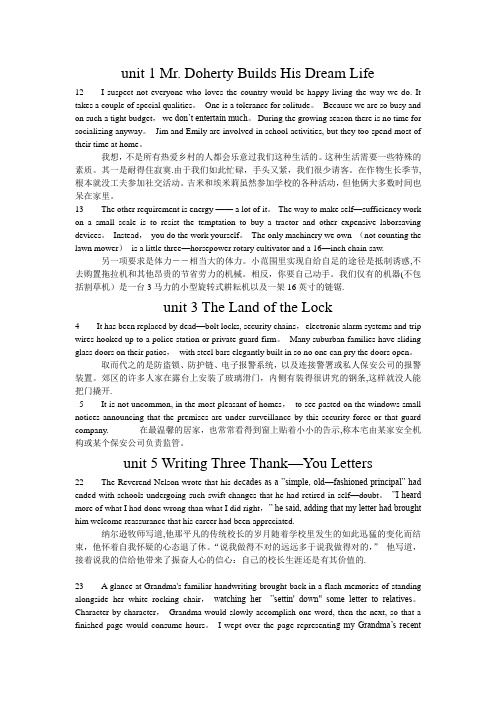
unit 1 Mr. Doherty Builds His Dream Life12 I suspect not everyone who loves the country would be happy living the way we do. It takes a couple of special qualities。
One is a tolerance for solitude。
Because we are so busy and on such a tight budget,we don’t entertain much。
During the growing season there is no time for socializing anyway。
Jim and Emily are involved in school activities, but they too spend most of their time at home。
我想,不是所有热爱乡村的人都会乐意过我们这种生活的。
这种生活需要一些特殊的素质。
其一是耐得住寂寞.由于我们如此忙碌,手头又紧,我们很少请客。
在作物生长季节,根本就没工夫参加社交活动。
吉米和埃米莉虽然参加学校的各种活动,但他俩大多数时间也呆在家里。
13 The other requirement is energy —— a lot of it。
The way to make self—sufficiency work on a small scale is to resist the temptation to buy a tractor and other expensive laborsaving devices。
Instead,you do the work yourself。
The only machinery we own (not counting the lawn mower)is a little three—horsepower rotary cultivator and a 16—inch chain saw.另一项要求是体力――相当大的体力。
- 1、下载文档前请自行甄别文档内容的完整性,平台不提供额外的编辑、内容补充、找答案等附加服务。
- 2、"仅部分预览"的文档,不可在线预览部分如存在完整性等问题,可反馈申请退款(可完整预览的文档不适用该条件!)。
- 3、如文档侵犯您的权益,请联系客服反馈,我们会尽快为您处理(人工客服工作时间:9:00-18:30)。
unit 1 Mr. Doherty Builds His Dream LifeIn America many people have a romantic idea of life in the countryside. Many living in towns dream of starting up their own farm, of living off the land. Few get round to putting their dreams into practice. This is perhaps just as well, as the life of a farmer is far from easy, as Jim Doherty discovered when he set out to combine being a writer with running a farm. Nevertheless, as he explains, he has no regrets and remains enthusiastic about his decision to change his way of life.在美国,不少人对乡村生活怀有浪漫的情感。
许多居住在城镇的人梦想着自己办个农场,梦想着靠土地为生。
很少有人真去把梦想变为现实。
或许这也没有什么不好,因为,正如吉姆·多尔蒂当初开始其写作和农场经营双重生涯时所体验到的那样,农耕生活远非轻松自在。
但他写道,自己并不后悔,对自己作出的改变生活方式的决定仍热情不减。
Mr. Doherty Builds His Dream LifeJim DohertyThere are two things I have always wanted to do -- write and live on a farm. Today I'm doing both. I am not in E. B. White's class as a writer or in my neighbors' league as a farmer, but I'm getting by. And after years of frustration with city and suburban living, my wife Sandy and I have finally found contentment here in the country.多尔蒂先生创建自己的理想生活吉姆·多尔蒂有两件事是我一直想做的――写作与务农。
如今我同时做着这两件事。
作为作家,我和E·B·怀特不属同一等级,作为农场主,我和乡邻也不是同一类人,不过我应付得还行。
在城市以及郊区历经多年的怅惘失望之后,我和妻子桑迪终于在这里的乡村寻觅到心灵的满足。
It's a self-reliant sort of life. We grow nearly all of our fruits and vegetables. Our hens keep us in eggs, with several dozen left over to sell each week. Our bees provide us with honey, and we cut enough wood to just about make it through the heating season. 这是一种自力更生的生活。
我们食用的果蔬几乎都是自己种的。
自家饲养的鸡提供鸡蛋,每星期还能剩余几十个出售。
自家养殖的蜜蜂提供蜂蜜,我们还自己动手砍柴,足可供过冬取暖之用。
It's a satisfying life too. In the summer we canoe on the river, go picnicking in the woods and take long bicycle rides. In the winter we ski and skate. We get excited about sunsets. We love the smell of the earth warming and the sound of cattle lowing. We watch for hawks in the sky and deer in the cornfields. 这也是一种令人满足的生活。
夏日里我们在河上荡舟,在林子里野餐,骑着自行车长时间漫游。
冬日里我们滑雪溜冰。
我们为落日的余辉而激动。
我们爱闻大地回暖的气息,爱听牛群哞叫。
我们守着看鹰儿飞过上空,看玉米田间鹿群嬉跃。
But the good life can get pretty tough. Three months ago when it was 30 below, we spent two miserable days hauling firewood up the river on a sled. Three months from now, it will be 95 above and we will be cultivating corn, weeding strawberries and killing chickens. Recently, Sandy and I had to retile the back roof. Soon Jim, 16 and Emily, 13, the youngest of our four children, will help me make some long-overdue improvements on the outdoor toilet that supplements our indoor plumbing when we are working outside. Later this month, we'll spray the orchard, paint the barn, plant the garden and clean the hen house before the new chicks arrive. 但如此美妙的生活有时会变得相当艰苦。
就在三个月前,气温降到华氏零下30 度,我们辛苦劳作了整整两天,用一个雪橇沿着河边拖运木柴。
再过三个月,气温会升到95 度,我们就要给玉米松土,在草莓地除草,还要宰杀家禽。
前一阵子我和桑迪不得不翻修后屋顶。
过些时候,四个孩子中的两个小的,16 岁的吉米和13 岁的埃米莉,会帮着我一起把拖了很久没修的室外厕所修葺一下,那是专为室外干活修建的。
这个月晚些时候,我们要给果树喷洒药水,要油漆谷仓,要给菜园播种,要赶在新的小鸡运到之前清扫鸡舍。
In between such chores, I manage to spend 50 to 60 hours a week at the typewriter or doing reporting for the freelance articles I sell to magazines and newspapers. Sandy, meanwhile, pursues her own demanding schedule. Besides the usual household routine, she oversees the garden and beehives, bakes bread, cans and freezes, drives the kids to their music lessons, practices with them, takes organ lessons on her own, does research and typing for me, writes an article herself now and then, tends the flower beds, stacks a little wood and delivers the eggs. There is, as the old saying goes, no rest for the wicked on a place like this -- and not much for the virtuous either.在这些活计之间,我每周要抽空花五、六十个小时,不是打字撰文,就是为作为自由撰稿人投给报刊的文章进行采访。
桑迪则有她自己繁忙的工作日程。
除了日常的家务,她还照管菜园和蜂房,烘烤面包,将食品装罐、冷藏,开车送孩子学音乐,和他们一起练习,自己还要上风琴课,为我做些研究工作并打字,自己有时也写写文章,还要侍弄花圃,堆摞木柴、运送鸡蛋。
正如老话说的那样,在这种情形之下,坏人不得闲――贤德之人也歇不了。
None of us will ever forget our first winter. We were buried under five feet of snow from December through March. While one storm after another blasted huge drifts up against the house and barn, we kept warm inside burning our own wood, eating our own apples and loving every minute of it.我们谁也不会忘记第一年的冬天。
从12 月一直到3 月底,我们都被深达5 英尺的积雪困着。
暴风雪肆虐,一场接着一场,积雪厚厚地覆盖着屋子和谷仓,而室内,我们用自己砍伐的木柴烧火取暖,吃着自家种植的苹果,温馨快乐每一分钟。
When spring came, it brought two floods. First the river overflowed, covering much of our land for weeks. Then the growing season began, swamping us under wave after wave of produce. Our freezer filled up with cherries, raspberries, strawberries, asparagus, peas, beans and corn. Then our canned-goods shelves and cupboards began to grow with preserves, tomato juice, grape juice, plums, jams and jellies. Eventually, the basement floor disappeared under piles of potatoes, squash and pumpkins, and the barn began to fill with apples and pears. It was amazing.开春后,有过两次泛滥。
